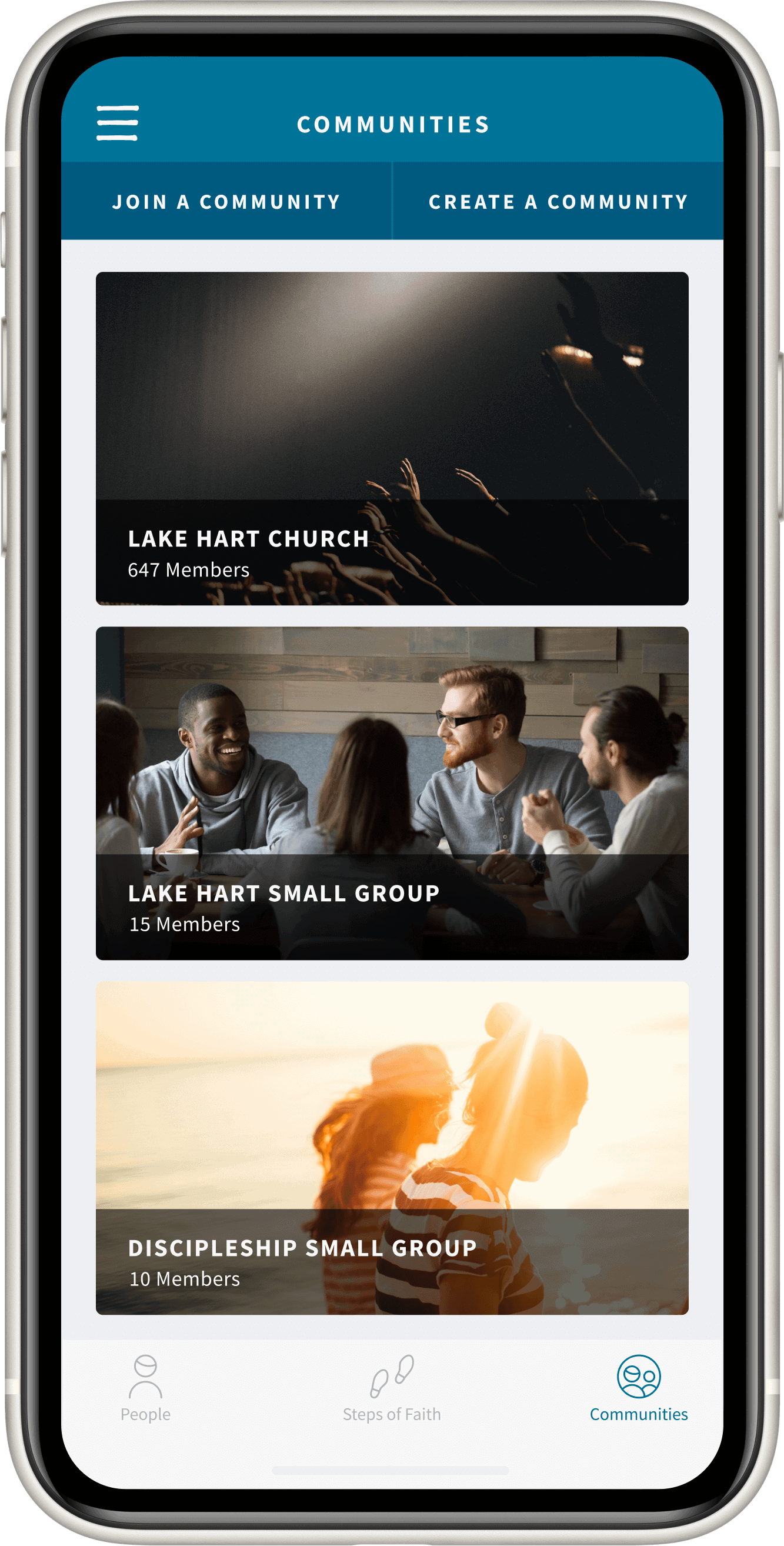Does the term “personal ministry” make sense to you? One simple test is to determine whether you can explain personal ministry to other followers of Jesus. Most importantly, can you do this in a way that makes it sound like something they can do themselves?
Choosing to invest your time and energy in helping someone else grow as a Christian is a step of faith. If you are at the point of wanting to help someone else develop a personal ministry, this post is for you. But if you’re still deciding whether you could commit to helping someone else in that way, this post will help you too.
Perhaps you lead one of our MissionHub Communities. Whether you would ever call yourself a coach or not — you are already being intentional about other people’s personal ministries. We want to give you ideas and a clear framework for that here.
First things first, let’s define what we mean by “personal ministry” in a way that helps you understand the journey you’ll be going on.
A working definition of personal ministry
The Bible makes it clear that God creates each of us to play a particular part in his plan of calling people into relationship with him.
“For we are God’s handiwork, created in Christ Jesus to do good works, which God prepared in advance for us to do” (Ephesians 2:10, New International Version).
But what do those “good works” involve?
You might be used to hearing and using words like “evangelism” and “discipleship” to answer that question. Let’s try to put this in simpler terms.
Jesus is the light of the world. We are invited to reflect his light to the people we live, work, play and study with in our everyday lives. This is the mission we’re called to live. Our personal ministry is the way we intentionally reflect Jesus to them — ideally in community with others who are doing similar things.
Reflecting Jesus’ light to those we live, work, play and study alongside looks like praying and caring for them, sharing our stories and God’s story with them, and relating to them in an authentic way.
So if you are thinking about coaching or guiding someone in personal ministry, it’s important to start with a foundation like this. Begin with a definition of personal ministry that you both agree on.
Hopefully you already have someone in mind whom you want to help grow in faith and ministry. Whether the label “coach” sits comfortably with you is not the most important thing. Call yourself a mentor, a guide or just that person’s friend if that makes it easier to get started.
Whatever you call yourself, MissionHub wants to help you help others.
Coaching begins with the right perspective
Many people think you need years and years of experience in a subject or activity before you can begin coaching someone else in it. Hopefully you have not bought into that myth.
Coaching others the way Jesus did is about helping them learn to do what you’re doing so they can help others do the same. How do we know this? The story of Jesus and his closest associates tells us.
People usually associate Jesus’ personal ministry with dramatic moments: Jesus healing people, raising others from death and feeding a crowd with one boy’s brown-bag lunch. What’s often left out of the highlight reel is the constant focus Jesus had on developing a small team of followers into people who could teach others to do what he was doing.
Jesus taught his disciples how to do personal ministry in such a way that they could teach others who could teach others, and so on and so on. It’s the ultimate example of “pay it forward.” The end goal is simple: everyone everywhere has the opportunity to hear God’s invitation to know him personally.
If you want to read a detailed account of the way Jesus trained his disciples, try Robert Coleman’s short but powerful book, “The Master Plan of Evangelism.”
Now that we have the right perspective for personal ministry, how do we move forward? Here are a few lessons I’ve learned through my own journey of coaching others, including a few essential elements of coaching I return to again and again.
Three simple steps in coaching other Christians
My husband and I started by coaching students on university campuses. We helped them see ways God wanted to use them in their dorms, classrooms, societies and social groups. We encouraged them to think beyond their campus and take the good news about Jesus to places around the globe.
Today we coach men and women of all different ages and stages of life who live in cities across the U.S. Our goal is to provide them with the support they need to build a personal ministry in whatever context God has placed them.
We work with engineers, entrepreneurs, financial consultants, school teachers, doctors and nurses, bloggers and event planners. Many of them were involved in college ministries and have a desire to share the gospel and invest their lives in others. Yet doing so in these new settings can feel daunting and complicated. It’s often hard for them to see how God can use them where they are.
But I have seen many Christians from completely different contexts learn how to have a ministry — and eventually help others do the same — by using these three simple steps.
1. Remind them of their identity
It’s crucial to cast vision for ministry by looking at the Bible. Circumstances, jobs, relationships and schedules might change, but God does not.
One of my favorite books in the New Testament is 1 Peter. Peter, one of Jesus’ closest friends, reminds us that our identity in Christ is radically different now than it was before God saved us.
“All praise to God, the Father of our Lord Jesus Christ. It is by his great mercy that we have been born again, because God raised Jesus Christ from the dead. Now we live with great expectation, and we have a priceless inheritance – an inheritance that is kept in heaven for you, pure and undefiled, beyond the reach of change and decay. And through your faith, God is protecting you by his power until you receive this salvation, which is ready to be revealed on the last day for all to see” (1 Peter 1:3–5, New Living Translation).
God, who caused us to be born again, completely transformed our identity. We are now God’s heirs — part of his family — waiting for the day of our inheritance. As the apostle Paul says in 2 Corinthians 5:17, we are new — the old has gone and the new has come. Whatever defined us before, such as our career or certain relationships, no longer defines us.
This new identity in Christ is the foundation for living, working a job, relating to a spouse and friends, and sharing the gospel with all kinds of people.
This truth can encourage people who’ve transitioned to a new job in a new city. My husband and I work with lots of people like this. They’re often recent college graduates, just starting their first post-college job. They can feel intimidated, overwhelmed, lonely and uncertain.
These individuals were confident of their identity in Christ in the place they came from. Now they needed to find that confidence again, but in a new setting.
When I first met Kelly she was just starting out as an elementary school teacher. She really struggled in her job at first. She had a huge class of second-graders and not a lot of support from her school. So we studied the Bible together, talking about the reality of the gospel in her life during that hard season.
Kelly eventually took a step of faith during those tough times. She started leading a small group through our church, investing her life in other women in similar circumstances. In doing so, she opened up her home to others who needed the same reminders about their identity.
What passages of Scripture help you to remember your identity in Christ? You could encourage the person you’re coaching to create a step of faith in MissionHub to read those verses every day for a week and pray in response to them.

2. Identify where God is already working — then join him
Another important aspect of coaching is helping Christians recognize the mission field just beyond their front door.
My husband, Bob, meets with Tom, an engineer who started walking with God just a few years ago. Tom was eager to start a ministry and even talked with Bob about leaving his job for full-time Christian work. Instead Bob encouraged him to look at all the different places God could use him: on the job, in his neighborhood and even while getting his pilot’s license.
Tom and his wife began using their God-given hospitality as the foundation for a personal ministry. Their willingness to open their home was a natural way to begin meaningful gospel conversations with people around them.
For the past few years they’ve invited international college students, friends from work and neighbors into their home for meals around the Christmas and Easter holidays. Most of the people they invite have never celebrated Christmas or Easter. Some of them have recently experienced a divorce or other personal hardship. Others have nowhere else to go during those holidays.
Tom and his wife create a casual atmosphere that allows for meaningful spiritual conversations around the dinner table. They recognized that God could work in their own home. So they joined God by making their home the base of their personal ministry.
Tom also tried starting a weekly prayer time at work, but the opportunity fell through. Rather than giving in to discouragement he looked for where else God might be at work in his life. He discovered that his flight instructor has a vision to use his flight company as a way to serve God and serve the less fortunate. So Tom is being intentional about the conversations he has with his flight instructor. He’s coaching him in a way that feels natural.
Ask the people you want to coach where God is already at work in their life. Make that their starting point for personal ministry. If they are unsure where God is working, you have something to pray about together.
3. Pray for the ministry of the person you coach
Praying for someone is a powerful way to help guide him or her in personal ministry. God can give you an ability to see his gifts at work in the life of the person you coach.
Here are four ways to pray for someone else’s personal ministry:
Pray that the Holy Spirit provides the person you coach with wisdom.
James 1:5 (ESV) says, “If any of you lacks wisdom, let [him or her] ask God, who gives generously to all without reproach, and it will be given [to him or her].”
Pray that the person you coach experiences the fullness of the Holy Spirit and the Spirit’s clear guidance and boldness.
“And when they had prayed, the place in which they were gathered together was shaken, and they were all filled with the Holy Spirit and continued to speak the word of God with boldness” (Acts 4:31, ESV).
Pray with the person or people you’re coaching.
Praying and trusting God together is a significant way to support someone who wants to start a ministry. When you’re unable to meet in person, you can pray together using Google Hangouts, Zoom or something similar.
When circumstances change suddenly, as they recently have for us all, praying together provides a sense of stability and consistency.
Encourage the person you coach to regularly pray in or for the place where he or she takes steps of faith.
Use MissionHub to set reminders to pray for people you regularly cross paths with and the places where that happens. If you’re praying for work colleagues, remind yourself to pray when you’re in that location. If it’s classmates, set reminders to pray as you walk around the halls or dorms of your college.
One step of faith many people choose from MissionHub’s suggested steps is offering to pray for someone who does not yet know Jesus. Doing this wherever you normally see that person brings God right into the space where you are developing a personal ministry.
If you cannot physically pray in the location, create a step of faith in MissionHub to pray for that place at the same time every day.
MissionHub helps you do everything I’m describing. The Communities feature of the MissionHub app allows you to form groups. Communities pray for one another’s ministry goals, choose steps of faith to take together, and celebrate what they see God doing over time.

If you’re coaching someone — or if you want to — think about creating a MissionHub Community. As the Community Leader you can also provide tips and links to useful resources, right in your Community space. Maybe this is your next step of faith.
So those are the three things I do over and over with people I am coaching.
My preference is to meet physically with people I coach, but none of these elements of coaching depend on that. So how do you coach someone at a time when we’re all living in a very different way?
Coaching through a time of crisis — A beginner’s guide
I never imagined living during a pandemic. You’re probably the same in that sense. Maybe you’re even wondering if coaching others to start ministries is the right thing to think about right now.
Remember, we started this conversation with a brief reminder of our identity. We are members of God’s family.
Peter wrote to an audience of dispersed people. The Roman government had sent them to live in foreign countries and cities and towns. Their lives were turned upside down. Normal social structures were disrupted. Does that sound familiar?
Throughout the entire letter Peter encourages them to love and care for the people nearby and to “proclaim the excellencies of him who called [them] out of darkness and into his marvelous light” (1 Peter 2:9–11). He urges his readers to love one another, speak well of each other, practice hospitality, and use their God-given gifts with courage and boldness.
Peter helped them see their crisis as an opportunity to practice the gospel.
Pandemic or no pandemic, the principles here remain the same — we just apply them more creatively right now.
Even if someone you coach cannot physically be in the location their ministry is focused on, the same principles apply.
- Remind them of their identity — they are part of God’s family.
- Help them identify where God is already at work and encourage them to join God in that work. We can continue building relationships with people we are not physically present with.
- Pray with them and for them, and encourage them to develop and deepen their conversations with God.
Coaching other people is not primarily about passing on information, or imparting years of experience to someone. Or at least it does not have to be.
Do you know someone with a desire to take steps of faith and to see God at work? Are you willing to come alongside them, encourage them and share your own journey of taking steps of faith?
Choosing to coach someone like this is a step of faith in and of itself. It’s also an opportunity God wants each of us to experience.
Photo Credit: Tom Mills, © Cru.


